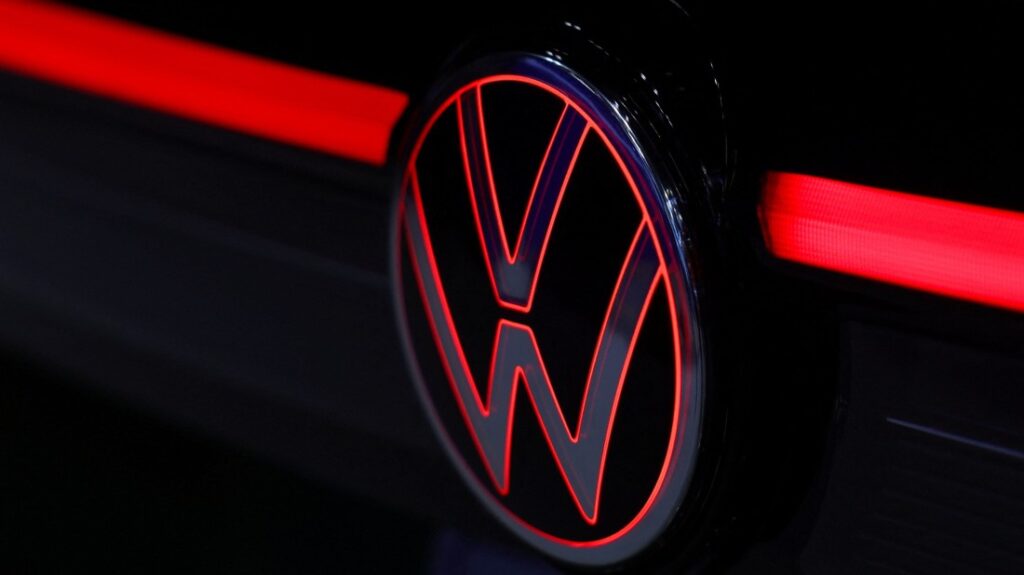Volkswagen, Europe’s largest automaker, has revised its financial outlook for 2025 downward following a significant €1.3 billion ($1.5 billion) hit to its first-half earnings attributed primarily to escalated U.S. import tariffs.
The company reported a 33% drop in its operating result for the first six months, falling to €6.7 billion, while sales revenue remained flat at €158.4 billion compared to the previous year.
This adjustment comes amid broader trade tensions, with U.S. tariffs on vehicles reaching 27.5%, combining a recent 25% levy on top of preexisting duties.
In addition to the tariff impact, Volkswagen cited €700 million in restructuring costs and a shift toward higher sales of lower-margin electric vehicles (EVs) as contributing factors to the profit decline.
Despite these challenges, the company’s second-quarter operating margin hovered near 7%, aligning with the upper end of internal expectations when excluding one-off factors.
Net cash flow turned negative at €1.4 billion, yet investor sentiment remained positive, with shares climbing over 3% in European trading by midday following the announcement.
Regionally, the tariffs have notably dented Volkswagen’s performance in the U.S., where sales plummeted 16% in the first half of 2025.
This decline was partially offset by robust growth elsewhere: a 19% sales increase in South America and a 2.3% rise in the European Union, even as the overall EU market contracted by 1.9%.
On a brighter note, demand for Volkswagen’s EVs surged, with orders up 62% and the company capturing a 28% share of Europe’s EV market segment.
CEO Oliver Blume expressed optimism about potential relief through a U.S.-EU trade deal, hinting at reduced tariffs in exchange for increased U.S. investments, similar to recent U.S.-Japan agreements.
Broader Impact on U.S. Income from Tariffs
The tariffs imposing such strain on companies like Volkswagen are generating substantial revenue for the U.S. government. As of June 2025, customs duties have already topped $108 billion in fiscal year collections, marking a significant uptick from previous years.
By mid-July, total tariff income reached $104 billion, a 115% increase over the same period last year, underscoring the policy’s fiscal yield amid ongoing trade policies.
Treasury officials project that U.S. tariff revenue could climb to $300 billion for the full year, reflecting the expanded scope of duties on imports, including autos.
Over the longer term, these measures are estimated to raise $2.9 trillion from 2026 to 2035, though dynamic effects like reduced economic activity could offset $467 billion in potential revenue.
While proponents argue this bolsters domestic industries, critics highlight the downstream costs to global trade partners and U.S. consumers through higher prices.
Ripple Effects on the EU Car Market
The U.S. tariffs are reverberating through the European Union’s automotive sector, where Volkswagen and peers like Audi and Porsche face heightened export costs, prompting strategic shifts.
EU automakers are lobbying for a trade agreement to lower the 25% tariff barrier, potentially tying reductions to U.S.-based production investments.
In the EU, the market has shown resilience with Volkswagen’s sales edging up despite a broader downturn, but overall industry profits are under pressure as tariffs erode margins on U.S.-bound exports.
This has accelerated a pivot toward EVs, where Europe holds strengths, but rising costs could lead to higher consumer prices and slower growth if trade frictions persist.
Analysts warn that prolonged tariffs might force relocations or partnerships, reshaping the EU’s car manufacturing landscape and potentially impacting jobs in export-heavy regions like Germany.
As trade negotiations unfold, Volkswagen’s experience highlights the intersection of geopolitics and industry, particularly in the energy transition via EVs. The company remains focused on realigning its model for sustainability, but the tariff saga underscores the need for balanced global policies to support clean energy advancements in mobility.
It will take some time for businesses to adjust to the new trading blocs. Those following Net Zero energy policies, or those looking to fall into financial collapse. In the short term, the tariff right-sizing by President Trump will be painful for those who base their business plans on the old model.
Is Oil & Gas Right for Your Portfolio?
Crude Oil, LNG, Jet Fuel price quote
ENB Top News
ENB
Energy Dashboard
ENB Podcast
ENB Substack

